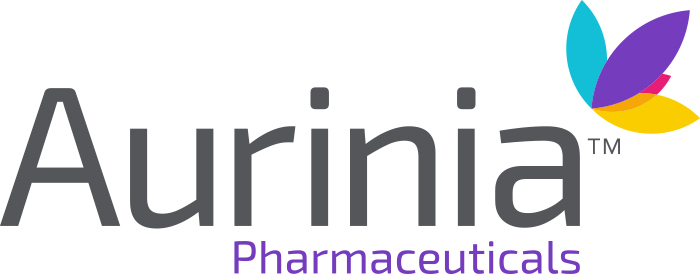Aurinia Pharmaceuticals Inc. diskutieren
Aurinia Pharmaceuticals Inc.
WKN: A1W7D4 / Name: Aurinia Pharma / Aktie / Biotechnologie & medizinische Forschung / Small Cap /
Phase II Ziele Erreicht, Kurs halbiert...
Selten eine so heftige Reaktion auf einen "Target-Hit" in einer Phase IIB gesehen. Sicher, die Todesfälle lassen alle Alarmglocken läuten, aber wir sprechen von LUPUS (Dr. House lässt grüßen) und da halte ich die Erklärungen von Aurinia für durchaus einleuchtend. Ich denke hier kann man mal was probieren...
Aurinia lupus candidate hits PhII target, but deaths send stock down
Aurinia Pharmaceuticals has published positive new data for its experimental drug voclosporin for active lupus nephritis--but 12 deaths in the study's treatment arm has sent alarm bells ringing.
Canadian biotech Aurinia Pharmaceuticals ($AUPH) posted the topline results from its Phase IIb AURA-LV study this morning in a test that was focused on patients with active lupus nephritis (LN), a form of the disease known as lupus or systemic lupus erythematosus (SLE), which has a number of subpopulations and complications from the broader condition.
Lupus kidney disease (a.k.a. lupus nephritis) is one of the most serious and potentially life-threatening complications of this autoimmune disease, affecting as many as 60% of people with lupus.
The biotech said that its trial hit the primary endpoint by showing statistically significantly greater complete remission of the disease in patients treated with voclosporin twice a day over 24 weeks of treatment.
The trial pitted voclosporin added to current standard-of-care therapy, namely Roche’s ($RHHBY) organ rejection drug CellCept (mycophenolate mofetil), against placebo plus CellCept in achieving complete remission in 265 patients with active LN.
Data showed that 32.6% of patients in the low dose voclosporin arm, 27.3% in the high dose arm and 19.3% in the control arm achieved complete remission (CR), the study’s primary endpoint. Patients treated with voclosporin were also twice as likely to achieve CR compared with placebo. But the market has not responded well to these data, with its shares down around 50% pre-market.
Analysts at Leerink said that the stock was trading down because there were 13 deaths across the study, with 10 in the low dose arm of the drug. The company said however that these deaths were due to the severe underlying nature of the disease, and not its drug.
“While this does naturally raise questions, it is important to be mindful that these lupus nephritis patients were extremely sick and treated at many sites with differing practice patterns in Asia, some of which we believe were in much less developed places,” Leerink said in a note to clients.
“The company noted that there were no clear underlying patterns among the deaths, and that one patient (who achieved complete remission) for example had baseline proteinurea of 29 grams, which was the highest value they have ever seen in their entire career of treating lupus patients.”
It also said on the efficacy side that at first glance, the effectiveness seen in the drug arms “looks lower than what we had expected, but is still respectable.”
The drug works as a calcineurin inhibitor and as an immunosuppressant. By inhibiting calcineurin, voclosporin blocks IL-2 expression and T-cell mediated immune responses.
“We are very pleased by these encouraging results and are grateful to those that participated in our clinical trials,” said Neil Solomons, Aurinia’s CMO.
“The AURA study was conducted under rigorous and stringent criteria, enhancing our confidence in voclosporin’s potential ability to provide a substantial improvement over the currently accepted standard of care, especially given that study participants had such active disease and were exposed to such a low corticosteroid load. We continue to work diligently towards our goal of improving long-term outcomes for these patients.”
Aurinia said in a statement that it now plans to meet with the FDA at the end of the year to: “Discuss these data and the drug’s subsequent clinical development and path to registration in LN.”
There are still more data to be presented, however, and the study will continue through 48 weeks, with results set to be released early next year.
A number of companies are looking into lupus treatments, including Biogen’s ($BIIB) anti-BDCA2 antibody that is currently in Phase I and UCB’s dapirolizumab pegol, an anti-CD40 ligand currently in early-stage trials that is expected to move into midstage by year’s end. Biogen also recently snuck in a new lupus treatment, a Bruton’s tyrosine kinase (Btk) inhibitor known as BIIB068, into the clinic earlier this year.
SLE is a difficult-to-treat disease with a number of variations and subpopulations of patients such as LN--but one littered with late-stage failures.
A few years ago, GlaxoSmithKline ($GSK) became the first drugmaker in more than half a century to gain approval for a new treatment for the disease in the form of Benlysta (belimumab).
The drug, a human monoclonal antibody that selectively targets B-lymphocyte stimulator, has however struggled to make much of a sales impact for the company since its FDA approval in 2011.
Benlysta has a license for patients with active, autoantibody‑positive SLE who are receiving standard therapy--but brought home just £230 million ($338 million) in 2015. It has not, however, been approved for severe active lupus nephritis.
Other candidates are also in the mix for lupus, including UCB’s epratuzumab--although this failed two Phase III trials last year after missing its primary endpoints. AstraZeneca ($AZN) also posted positive Phase II data for its SLE candidate anifrolumab last year. Eli Lilly ($LLY) had been testing its drug tabalumab for the condition, but this was axed in 2014 after it too failed several pivotal late-stage studies.
Anthera Pharmaceuticals’ blisibimod, which focuses on anti-BAFF activity in LSE, is still going in mid- to late-stage studies. And in May, a new startup biotech called Thunderbolt was launched as the brainchild of Baxalta, the Mayo Clinic and Velocity Pharmaceutical Development, with a focus on SLE, also via an anti-BAFF mechanism.
Quelle: Questex LLC
NEW Anlauf
lang
De omnibus dubitandum, aber...
Chancen überwiegen. Spekulative Buy
Aurinia Pharmaceuticals: Highlighting an Important Clinical and Regulatory Change
klostergang stimmt am 06.04.2017 der fundamentalen Bewertung mit dem Ergebnis überbewertet nicht zu.
Unter den drei Analysten , die Aurinia Pharmaceuticals Inc. ( NASDAQ: AUPH ), haben 3 die Note Kauf und Verkauf 0 0 Halten. Daher ist zu 100% positiv. Aurinia Pharmaceuticals Inc. hatte 6 Analystenberichte seit 30. Juni 2016 nach SRatingsIntel. Canaccord Genuity stufte Aurinia Pharmaceuticals Inc. (NASDAQ: AUPH) am 13. September in der Note "Speculative Buy". Das Unternehmen erhielt die Bewertung „Kaufen“ Freitag 30. Dezember HC Wainwright. Cantor Fitzgerald ist mit dem Vermerk „Buy“ und das Ziel von $ 1400 im Bericht über Freitag, 11. August gehalten. Das Unternehmen erhielt die Bewertung „Kaufen“ MONTAG, 5. Juni durch Cantor Fitzgerald. Dienstag 11. April, den Handel an der Gesellschaft wurde von Cantor Fitzgerald ins Leben gerufen. Am Freitag , 30. Juni wurde die Bewertung des Unternehmens von HC Wainwright ins Leben gerufen.
PHARMA
Unter den drei Analysten , die Aurinia Pharmaceuticals Inc. ( NASDAQ: AUPH ), haben 3 die Note Kauf und Verkauf 0 0 Halten. Daher ist zu 100% positiv. Aurinia Pharmaceuticals Inc. hatte 6 Analystenberichte seit 30. Juni 2016 nach SRatingsIntel. Canaccord Genuity stufte Aurinia Pharmaceuticals Inc. (NASDAQ: AUPH) am 13. September in der Note "Speculative Buy". Das Unternehmen erhielt die Bewertung „Kaufen“ Freitag 30. Dezember HC Wainwright. Cantor Fitzgerald ist mit dem Vermerk „Buy“ und das Ziel von $ 1400 im Bericht über Freitag, 11. August gehalten. Das Unternehmen erhielt die Bewertung „Kaufen“ MONTAG, 5. Juni durch Cantor Fitzgerald. Dienstag 11. April, den Handel an der Gesellschaft wurde von Cantor Fitzgerald ins Leben gerufen. Am Freitag , 30. Juni wurde die Bewertung des Unternehmens von HC Wainwright ins Leben gerufen.
Aurinia mit Medikament zur Behandlung von Lupusnephritis (LN)
Aurinia hat mit Voclosporin (einen und nur einen Pipeline-Kandidaten), einen sog. Calcineurin-Inhibitor, der Immunantworten unterdrückt. Das Immunsystem einer Person zu blockieren ist normalerweise keine gute Sache, aber es ist sehr positiv, wenn das körpereigene Immunsystem das eigene Gewebe angreift. Genau das passiert bei Lupusnephritis (LN), einer Nierenentzündung, von der mehr als 500.000 Menschen in den USA betroffen sind.
Die Ergebnisse von Aurinia aus der Phase-2b-Studie mit Voclosporin bei der Behandlung von LN geben Anlass zu der Annahme, dass mehr als nur eine 50- bis 50-prozentige Chance auf Zulassung besteht. Es war keine winzige Studie mit 256 Patienten in 20 Zentren. Fast die Hälfte (49%) der Patienten, die die niedrigere Dosis von Voclosporin erhielten, erlebten nach 48 Wochen eine vollständige Remission, verglichen mit 24% der Patienten unter Placebo. Mehr als zwei Drittel der Patienten, die Voclosporin einnahmen, hatten nach 48 Wochen eine partielle Remission, verglichen mit 48% der Patienten unter Placebo. Dies sind sehr signifikante Unterschiede.
Auch aus der Studie ergaben sich keine ernsthaften Sicherheitsbedenken. Tatsächlich hatten Patienten unter Placebo schlechtere Sicherheitsergebnisse als die Gruppe, die Voclosporin einnahm, wobei drei Todesfälle und eine Malignität nach der Studienbehandlungsperiode im Kontrollarm berichtet wurde.
Wenn Voclosporin die Zulassung erhält, gibt es ein großes Marktpotenzial , von vielleicht 1,5 Milliarden Dollar pro Jahr oder mehr.
Es würde mich überhaupt nicht überraschen, wenn bei erfolgreicher Zulassung AbbVie zugreift, wie
Rich Gonzalez, CEO von AbbVie schon im November letten Jahres verlauten ließ.
Biotechnologie und Medizintechnik SecteurRecherche Agenda 15/03 Ergebnisse Veröffentlichung
Aurinia Pharmaceuticals, Inc. betreibt als pharmazeutisches Unternehmen im klinischen Stadium, die bei der Entwicklung eines therapeutischen Arzneimittels greifen Autoimmunerkrankungen zu behandeln, besonders Lupus Nephritis.
Das Unternehmen wurde von Robert Foster, Richard Glickman und Michael Martin Juni 1993 16, gegründet und ist in Victoria, Kanada.
Biotechnologie und Medizintechnik SecteurRecherche Agenda 15/03 Ergebnisse Veröffentlichung
Aurinia Pharmaceuticals, Inc. betreibt als pharmazeutisches Unternehmen im klinischen Stadium, die bei der Entwicklung eines therapeutischen Arzneimittels greifen Autoimmunerkrankungen zu behandeln, besonders Lupus Nephritis.
Das Unternehmen wurde von Robert Foster, Richard Glickman und Michael Martin Juni 1993 16, gegründet und ist in Victoria, Kanada.
Aurinia mit Medikament zur Behandlung von Lupusnephritis (LN)
Aurinia hat mit Voclosporin (einen und nur einen Pipeline-Kandidaten), einen sog. Calcineurin-Inhibitor, der Immunantworten unterdrückt. Das Immunsystem einer Person zu blockieren ist normalerweise keine gute Sache, aber es ist sehr positiv, wenn das körpereigene Immunsystem das eigene Gewebe angreift. Genau das passiert bei Lupusnephritis (LN), einer Nierenentzündung, von der mehr als 500.000 Menschen in den USA betroffen sind.
Die Ergebnisse von Aurinia aus der Phase-2b-Studie mit Voclosporin bei der Behandlung von LN geben Anlass zu der Annahme, dass mehr als nur eine 50- bis 50-prozentige Chance auf Zulassung besteht. Es war keine winzige Studie mit 256 Patienten in 20 Zentren. Fast die Hälfte (49%) der Patienten, die die niedrigere Dosis von Voclosporin erhielten, erlebten nach 48 Wochen eine vollständige Remission, verglichen mit 24% der Patienten unter Placebo. Mehr als zwei Drittel der Patienten, die Voclosporin einnahmen, hatten nach 48 Wochen eine partielle Remission, verglichen mit 48% der Patienten unter Placebo. Dies sind sehr signifikante Unterschiede.
Auch aus der Studie ergaben sich keine ernsthaften Sicherheitsbedenken. Tatsächlich hatten Patienten unter Placebo schlechtere Sicherheitsergebnisse als die Gruppe, die Voclosporin einnahm, wobei drei Todesfälle und eine Malignität nach der Studienbehandlungsperiode im Kontrollarm berichtet wurde.
Wenn Voclosporin die Zulassung erhält, gibt es ein großes Marktpotenzial , von vielleicht 1,5 Milliarden Dollar pro Jahr oder mehr.
Es würde mich überhaupt nicht überraschen, wenn bei erfolgreicher Zulassung AbbVie zugreift, wie
Rich Gonzalez, CEO von AbbVie schon im November letten Jahres verlauten ließ.
Werden
die 10$ angepeilt?










Neueste Beiträge
MBU in Gamestop Corp. diskutieren